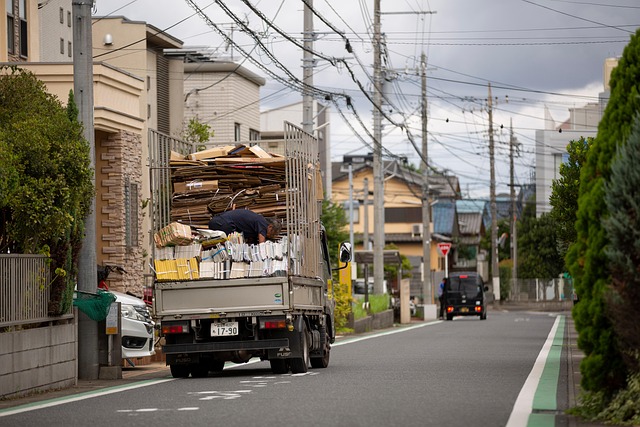Recycling Old Computers: Boston’s Legal Electronic Disposal Guide

Boston residents and businesses have access to multiple eco-friendly solutions for responsible electronic waste (e-waste) disposal, including local no…….
In the rapidly evolving digital landscape, the responsible management of electronic waste (e-waste) has become a paramount concern for cities worldwide, including Boston, Massachusetts. “Where to recycle electronics Boston” is not merely a question of disposal but involves a complex ecosystem of collection points, processing facilities, and regulatory frameworks designed to minimize environmental impact and maximize resource recovery. This article aims to provide an in-depth exploration of the various avenues available for Bostonians to recycle their electronic devices, highlighting the importance of proper e-waste management and its global implications.
Definition:
Electronic waste recycling, or e-waste recycling, refers to the process of recovering valuable materials from discarded electronic devices such as computers, smartphones, televisions, and small household appliances. This includes disassembling, sorting, and processing various components for reuse or safe disposal.
Boston’s Context:
In Boston, the need for efficient e-waste recycling has grown alongside the city’s thriving technology sector and increasing consumer reliance on electronic gadgets. The Massachusetts Department of Environmental Protection (MassDEP) plays a pivotal role in regulating and promoting responsible e-waste management practices within the state. Boston itself has implemented several initiatives to ensure that residents have accessible options for recycling their old electronics.
Significance:
E-waste recycling is crucial due to:
International Influence:
The proper disposal and recycling of electronic waste have become global priorities, driven by the growing awareness of environmental sustainability and resource conservation. International agreements, such as the Basel Convention, aim to regulate the transboundary movement of hazardous waste, including e-waste, ensuring that developing countries do not bear the brunt of irresponsible dumping.
Regional Trends:
Market Dynamics:
The global e-waste recycling market is characterized by:
Investment Patterns:
Private investments in e-waste recycling facilities are influenced by:
Economic Impact in Boston:
In Boston, the e-waste recycling sector contributes to:
Incentives for Innovation:
The need to enhance e-waste recycling efficiency has driven technological breakthroughs:
Future Potential:
Emerging technologies like blockchain can revolutionize e-waste tracking, ensuring transparency and accountability in the supply chain. Additionally, 3D printing using recycled materials may expand product design possibilities while reducing the need for virgin resources.
Key Policies in Massachusetts:
International Agreements:
As a signatory to the Basel Convention, the US, and by extension Massachusetts, is committed to:
Main Issues:
Proposed Solutions:
Boston’s Success Stories:
| Case Study | Location | Approach | Outcomes |
|---|---|---|---|
| E-Waste Collection Event | Boston Common | One-day event with multiple collection points, partnering local businesses and schools. | Collected over 5 tons of e-waste, engaged 200+ participants, and raised $10,000 for environmental education programs. |
| Pilot Refurbishment Program | East Boston | Collaborated with a tech startup to refurbish donated computers for low-income families. | Successfully reused 300 devices, providing digital accessibility to underserved communities, and generating positive media attention. |
| School-Based Recycling Initiative | Boston Public Schools | Implemented e-waste collection drives during school holidays, involving students in environmental education. | Achieved an average of 80% participation rate, diverting over 10 tons of e-waste from landfills annually. |
Growth Areas:
Emerging Trends:
Strategic Considerations:
The proper recycling of electronic waste in Boston is a multifaceted endeavor that requires collaboration between government agencies, businesses, and citizens. As the global landscape of e-waste management continues to evolve, Boston’s efforts to establish robust collection systems, promote technological advancements, and engage the community will be crucial in mitigating environmental challenges and ensuring a sustainable future. By understanding the nuances of “where to recycle electronics Boston,” individuals can actively contribute to this vital initiative, leaving a positive impact on both local ecosystems and global e-waste management practices.
Q: Where can I take my old computer for recycling in Boston?
A: Boston offers multiple options, including dedicated e-waste collection points at various city parks during special events, as well as year-round drop-off locations at local electronic stores and recycling centers. MassDEP also provides a directory of approved e-waste recyclers across the state.
Q: Are there any fees for recycling electronics?
A: Many recycling programs in Boston are free for residents, with some businesses offering incentives or take-back programs. However, certain specialized recycling processes or rare materials may incur costs, ensuring proper handling and safe disposal.
Q: How can I ensure my old phone is recycled responsibly?
A: Look for certifications on recycling services, such as those from reputable organizations like the Electronic Take-Back Coalition (ETK). These ensure that your device will be processed according to environmental standards, with data security and responsible material recovery priorities.
Q: What happens if I export old electronics out of Massachusetts?
A: The Basel Convention prohibits the transboundary movement of hazardous waste, including e-waste, without prior informed consent from receiving countries. Violations can result in legal penalties and environmental consequences. Responsible recycling within the state or through approved international channels is recommended.
Q: Can I recycle any electronic device, even broken ones?
A: Most e-waste recycling programs accept a wide range of devices, including those that are broken or malfunctioning. However, some facilities may have specific guidelines, so it’s best to check with the recycler beforehand. Even damaged electronics can be disassembled for valuable components and safe disposal.

Boston residents and businesses have access to multiple eco-friendly solutions for responsible electronic waste (e-waste) disposal, including local no…….

Boston residents and businesses have easy access to multiple e-waste recycling centers via online platforms like "where to recycle electronics Bo…….

Boston provides multiple eco-friendly options for recycling electronics, including free pick-up services and accessible local centers for residents to…….

Boston offers efficient and responsible electronic waste management through top-tier e-recycling facilities and same-day pickup services. Community ev…….

Boston offers diverse, business-friendly e-waste recycling options, including specialized services for harmful materials and convenient drop-off locat…….

Boston's electronics recycling landscape offers multiple accessible collection points for individuals and businesses to dispose of e-waste respon…….

Boston provides convenient and ethical options for recycling old electronics, including gaming consoles. Local e-recycling services prevent pollution,…….

Massachusetts, especially Boston, faces e-waste challenges but offers numerous responsible recycling options. Local services provide same-day pickup,…….

Where to recycle electronics Boston is crucial for mitigating e-waste's environmental impact. Local centers offer convenient drop-off points and…….

Boston encourages environmental sustainability through responsible e-waste management, offering numerous recycling options for various electronics. Lo…….